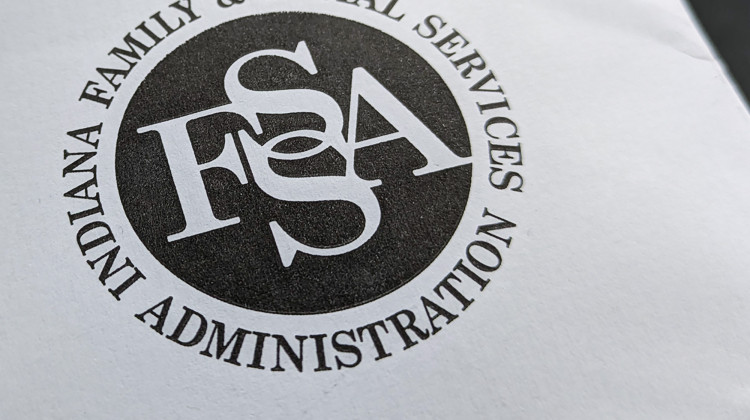
FSSA is using a new process to develop the December 2024 forecast, which will be presented to the State Budget Committee.
Lauren Chapman / IPB NewsIndiana Medicaid officials say they’ve adjusted their processes for financial reporting and forecasting to avoid future budget problems after a $1 billion error last year. Officials are starting their forecasting process earlier than normal and will continue to adjust the forecast as they collect more data.
The Indiana Family and Social Services Administration announced in January it would be improving its Medicaid forecasting and budget monitoring processes.
It started publishing monthly financial reports in May. The monthly financial reports include information for the specific month and year-to-date information on three categories: expenditures, enrollment and funding.
Paul Bowling, chief financial officer for FSSA, said the agency shares the reports with experts from other state agencies – including the state budget agency – to get feedback and develop commentary to improve the accuracy of this year’s forecast.
“We're setting up a reporting structure review process so that we can identify certain trends and risks that we may have not been able to catch in the past,” Bowling said.
That reporting structure review process includes two groups formed after last year’s forecast.
The financial reporting group was established to create and maintain the monthly Medicaid financial reports, which includes providing feedback on “unexpected” trends. Feedback from other agencies is shared with the reporting group to validate the information and determine if any additional research and discussions are needed.
“The overall objective of creating financial reporting is to improve our monitoring of various Medicaid data elements, and the comparison of this data to forecast projections,” Bowling said.
The policy change review group was created so all Medicaid policies go through a review process to ensure the agency understands the potential impact of the changes.
Bowling said the output from those two teams goes through a steering committee before final decisions are made. That committee is responsible for getting input from the governor’s office, and state budget and legislative fiscal staff.
Bowling said there are three goals for the new process: reduce “data lag,” identify emerging risks, and produce a more detailed review of trends in the forecast.
Indiana Medicaid Director Cora Steinmetz said getting as close to “real time” data as possible should improve the overall forecasting process.
“The more we can shrink that gap and data lag, the more accurate we're going to be able to forecast what we think expenditures and enrollment utilization looks like going forward,” Steinmetz said.
Bowling said FSSA is using the new process to develop the December 2024 forecast, which will be presented to the State Budget Committee.
“Since we're starting this process much earlier than normal, we will also be refreshing our data before the forecast is finalized, which allows us to utilize the most current data available,” Bowling said.
Some lawmakers on the Medicaid Oversight Committee questioned Medicaid officials on what they would be able to do if they did identify a problem.
Steinmetz said there are categories of cost controls the state can adjust depending on what causes the problem. These include eligibility and enrollment criteria, what services are covered and reimbursement rates. Steinmetz said each of those categories has different tools.
“If these are mandatory services or something that we're required to provide, we have limited ability to really control that as much as if it is something that's within our authority to take action to steer towards, a lower cost of care setting or steer towards lower cost service or control utilization or rates,” Steinmetz said.
Medicaid officials also provided updates on the cost-containment strategies FSSA announced in response to last year’s error. They said FSSA has implemented all of the strategies and completed most of them.
Most of the changes FSSA announced were focused on home- and community- based services for people with disabilities and people who want to age in place. Among other things, the agency implemented a waitlist for services, restructured one of its Medicaid waivers, and changed who is able to provide attendant care under the two new waivers.
Several lawmakers echoed criticism raised at last week’s Medicaid Advisory Committee meeting about the implementation of the waitlist.
Sen. David Niezgodski (D-South Bend) said many people don’t have enough information — such as where they are on the waitlist — which he said can create a lot of fear.
“If people are getting hurt in this process, that's the number one thing we should be concerned about,” Niezgodski said.
Steinmetz said FSSA isn’t able to predict when people will receive an invitation because the number of people in “priority” categories can fluctuate from month-to-month. She said the agency launched a dashboard to provide updates on how many people have been invited to transition off of the waitlist.
“We hope to continue to be able to give people a better idea of where they are on the waiver waiting list, so that they have an idea of how their families can plan, because we certainly appreciate that that's a challenging situation to be in,” Steinmetz said.
Steinmetz said if an invitation is declined – because the individual no longer qualifies or dies – FSSA will move to the next person on the list to reach the agency's capacity each month.
READ MORE: Indiana launches Medicaid waiver waitlist dashboard, lawmakers want more information
Join the conversation and sign up for the Indiana Two-Way. Text "Indiana" to 765-275-1120. Your comments and questions in response to our weekly text help us find the answers you need on Medicaid and other statewide issues.
Lawmakers also raised concerns about the financial effects of the waitlist on certain Hoosiers. Specifically, those who have spent down their assets and find themselves with few options as they wait for assisted living services through the Pathways waiver.
Steinmetz reiterated the state is looking to use American Rescue Plan Act funding from the COVID-19 public health emergency to provide temporary support for those individuals.
“We've identified the source of the funds for that and are just finalizing the process and application format for that particular funding pool,” Steinmetz said.
Steinmetz said she recognizes the waitlist creates a “challenging situation” for people waiting for services.
“Additional supports are available through the Area Agencies on Aging, such as the CHOICE program for individuals where there may be CHOICE dollars available,” Steinmetz said. “Additionally, 211 is prepared to help individuals find supports in their community.”
Lawmakers also questioned Medicaid officials about what caused the increase in Medicaid expenses leading to the forecasting error. Steinmetz said there was “unanticipated growth,” which is why FSSA focused on cost-containment strategies.
“For attendant care, specifically, utilization was the number one driver of the increases in expenditures,” Steinmetz said.
Steinmetz said rate increases and more enrollment on the waiver also contributed to the increase in program costs.
“There was a fairly significant home- and community-based services rate increase that went into effect on July 1, 2023, so that drove a decent piece of the growth that we saw in that particular waiver,” Steinmetz said.
Medicaid officials said they would continue to monitor the cost-containment strategies while they prepare for the next forecast. Meanwhile, more than 13,000 Hoosiers are waiting for services between two Medicaid waivers. Nearly 1,000 people have been added to the waitlist since FSSA began transitioning people off of the waitlist in July.
Abigail is our health reporter. Contact them at aruhman@wboi.org.
 DONATE
DONATE






 Support WFYI. We can't do it without you.
Support WFYI. We can't do it without you.